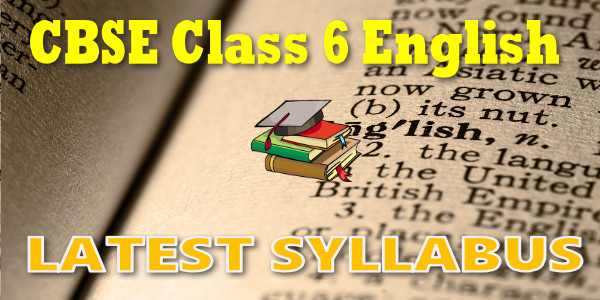CBSE Syllabus for Class 6 English 2024-25

CBSE, JEE, NEET, CUET
Question Bank, Mock Tests, Exam Papers
NCERT Solutions, Sample Papers, Notes, Videos
Latest CBSE Syllabus for Class 6 English 2024-25
The CBSE Class 6 English syllabus for the 2024-2025 academic year, based on the updated curriculum from cbse.nic.in, is designed to improve students' language skills in reading, writing, and communication. The syllabus covers a range of topics, including literature, grammar, and composition, to enhance vocabulary, comprehension, and creative expression. This curriculum helps students build a solid foundation in English, preparing them for their exams. The latest syllabus is available for free download in PDF format, making it easily accessible for students and educators. By following this syllabus, students can ensure effective preparation and strengthen their understanding of English.
Student Subscription
Unlock the exclusive content designed for the toppers

myCBSEguide App
Complete Guide for CBSE Students
NCERT Solutions, NCERT Exemplars, Revison Notes, Free Videos, CBSE Papers, MCQ Tests & more.
Latest CBSE Syllabus for Class 6 English

CBSE Academics Unit - Curriculum Syllabus
The CBSE Class 6 English syllabus for the 2024-2025 academic year is carefully crafted by the Central Board of Secondary Education (CBSE) through its specialized academic unit. Published on the official cbse.nic.in website, the syllabus outlines a comprehensive list of topics and chapters that focus on enhancing students' reading, writing, and language skills. It includes a variety of sections such as literature, grammar, and composition, aimed at improving vocabulary, comprehension, and expression. CBSE question papers are designed in accordance with this syllabus, ensuring alignment with the prescribed curriculum for the current session and supporting students in their exam preparation.
CBSE Syllabus category
- Secondary School Curriculum (class 9 and class 10)
- Senior School Curriculum (class 11 and class 12)
- Vocational Courses (Class 11 and class 12)
CBSE CLASS VI
CBSE Syllabus
ENGLISH
Background
Activities and materials that promote language growth in the early years have been described in some detail in the preceding section. Work at the upper primary level providing a basis for action and interventions in schools is described below. In general, vocabulary development through reading extensively with comprehension and interest and writing activities of a higher order than hitherto developed are the main goals of teaching/learning at this stage.
Objectives The general objectives at this stage are:
- to negotiate their own learning goals and evaluate their own progress, edit, revise, review their own work
- to understand, enjoy and appreciate a wide range of texts representing different cultures, ways of living
- to be able to articulate individual/personal responses effectively
- to use language and vocabulary appropriately in different contexts and social encounters
- to be able to organise and structure thoughts in writing/speech
- to develop production skills (fluency and accuracy in speaking and writing)
- to use dictionary suitable to their needs
- to understand and enjoy jokes, skits, children’s films, anecdotes and riddles
At the end of this stage learners will be able to do the following:
- understand the central idea and locate details in the text (prescribed and non-prescribed)
- use his/her critical/thinking faculty to read between the lines and go beyond the text
- narrate simple experiences, describe objects and people, report events to peers
- speak accurately with appropriate pauses and clear word/sentence stress to be intelligible in familiar social contexts
- write simple messages, invitations, short paragraphs, letters (formal and informal) applications, simple narrative and descriptive pieces, etc.
- use his/ her proficiency in English to explore and study other areas of knowledge through print and non-print media
- to undertake small projects on a regular basis
Language Items
At the upper primary level, knowledge of grammar remains a process of discovery combined with a conscious effort to explicitly understand and name grammatical items. However, these should not be taken out of contexts to be treated as discrete teaching items.
In addition to consolidating the items learnt earlier, the following will be introduced and recycled through the upper primary stage.
- Determiners
- Passivation
- linking words
- adjectives (comparative and superlative forms)
- adverbs (place and types)
- modal auxiliaries
- tense forms
- word order in sentence types
- clauses
- reported speech
Methods and Techniques
Classroom interaction would be such as to promote optimal learner participation leading to an urge to use language both in speech and writing. The selection of actual classroom procedures is left to the discretion of the teacher. However, the following are recommended:
- Role play
- Dramatization
- Reading aloud
- Recitation of rhymes, poems and making observations on a given topic/theme
- Telling and retelling stories, anecdotes, and jokes
- Discussion, debate
- Simple projects
- Interpreting pictures, sketches, cartoons
- Activities, tasks, and language games
- Pair work, group work, and short assignments both individual and group
- Exploring the electronic media
Download CBSE Syllabus in PDF
- Download CBSE Syllabus for class 12th
- Download CBSE Syllabus for Class-11
- Download CBSE Syllabus for Class-10
- Download CBSE Syllabus for Class-09
- Download CCE Syllabus for Class-08
- Download CCE Syllabus for Class-07
- Download CCE Syllabus for Class-06
- Download NCERT Syllabus for Class-05
- Download NCERT Syllabus for Class-04
- Download NCERT Syllabus for Class-03
Download CBSE Syllabus of Class 6th
- CBSE Class 06 Mathematics CBSE Syllabus
- CBSE Class 06 Science CBSE Syllabus
- CBSE Class 06 Social Science CBSE Syllabus
- CBSE Class 06 English CBSE Syllabus
- CBSE Class 06 Hindi सिलेबस
CBSE Syllabus 2024-25
CBSE Class 12 Syllabus 2024-25
CBSE Class 11 Syllabus 2024-25
CBSE Class 10 Syllabus 2024-25
CBSE Class 9 Syllabus 2024-25

myCBSEguide
Trusted by 1 Crore+ Students

Test Generator
Create papers online. It's FREE.

CUET Mock Tests
75,000+ questions to practice only on myCBSEguide app
 myCBSEguide
myCBSEguide